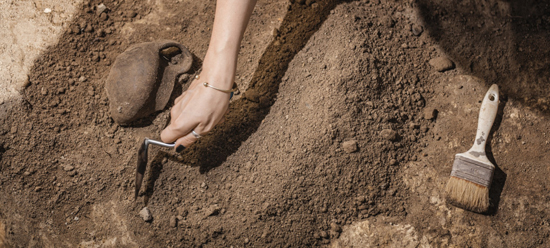Web Exclusive
A Therapeutic Analogy One of my least favorite questions to get from potential clients is, “How many sessions will this take?” I hate getting this question because the true answer—“I don’t know”—tends to be unsatisfying to everyone. Most therapeutic modalities are not defined down to a certain number of sessions. People are too complicated to be boxed into a strictly delineated system. Human psychology is a science, and therapy is its practical application. But as sciences go, it is a lot more like archaeology than neurology. I’ll explain. Psychology is the study of the mind; neurology is the study of the brain. But neurology relies on chemical formulas and mathematical equations. The mind, while not completely unpredictable, rarely operates with mathematical precision or formulaic rigor. Emotions can be irrational and fickle, motivating people to do things that don’t seem to make much sense. (Numbers can be irrational too, but at least those can be used to achieve a predictable and repeatable outcome; emotions sometimes surprise the most seasoned scientists of the mind.) This is not to cast aspersions on archaeology, mind you. Archaeology has guiding principles, structured approaches, and tested methodologies. But, as in therapy, you never quite know what you’re going to find. I often use archaeology as an analogy to explain to clients what it is we’re doing in therapy, to help them grasp the nature of the process as something less predictable than a chemistry experiment. It’s important that they know what they’re in for. When a person comes to therapy, there is often something under the surface that bears important lessons about how that person is living life in the present. But that secret is buried under a lot of layers. So as an archaeologist-therapist, I will help them to identify and demarcate the site that needs excavating. I will bring my tools and experience along with me. And then we begin to dig. We don’t always know exactly what we’re looking for, but we have a reasonable belief that we’re going to find something in the area. We’re not sure if what we find will be terribly helpful, but we can probably learn something useful from whatever we dig up. Sometimes we’re going to dig for a long time before we find anything at all. That’s okay. That’s part of the process. We may have to poke through multiple layers of personality before anything of significance comes to light. And then once we do unearth a small corner of something noticeable, it may take a while before we can see the whole artifact. We’ll have to excavate around it, then gently get in there with some finer tools to brush off the dust covering it up and preventing an authentic examination of what we’re seeing. Even once we have a picture of the whole object, we still may need to struggle to explain what it is and why it’s significant. Sometimes we’ll hit on something that looks exciting but will turn out to be a dud—an old can or a discarded shoe—a thought or experience that seemed consequential but turns out not to be so relevant after all. We may eventually find we’re looking in the wrong place altogether and decide to shift the excavation site to a different location. It’s all part of the process of discovery. It’s rarely a straight dig down to the goal. It takes patience. It takes multiple attempts. It takes failures. Some days may be filled with dark, rainy clouds that make it hard to do the work. But therapy, like archaeology, has a great track record. You can discover buried treasures that can change your understanding of a civilization, or of a single person, couple, or family. And with new understanding of the past comes the ability to make different decisions about the future. I tell my clients that no, I don’t know how long it will take us to find what we’re after. But I can promise you that there is a method to the madness, a science to the process. And if you are ready to break a sweat, there’s a treasure waiting to be found. — Raffi Bilek, LCSW-C, is a marriage and family therapist and the director of the Baltimore Therapy Center. |


